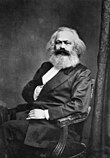This article needs additional citations for verification. (January 2019) |
This article possibly contains original research. (January 2019) |
| Part of a series on |
| Marxian economics |
|---|
 |
The organic composition of capital (OCC) is a concept created by Karl Marx in his theory of capitalism, which was simultaneously his critique of the political economy of his time. It is derived from his more basic concepts of 'value composition of capital' and 'technical composition of capital'. Marx defines the organic composition of capital as "the value-composition of capital, in so far as it is determined by its technical composition and mirrors the changes of the latter".[1] The 'technical composition of capital' measures the relation between the elements of constant capital (plant, equipment and materials) and variable capital (wage workers). It is 'technical' because no valuation is here involved. In contrast, the 'value composition of capital' is the ratio between the value of the elements of constant capital involved in production and the value of the labor. Marx found that the special concept of 'organic composition of capital' was sometimes useful in analysis, since it assumes that the relative values of all the elements of capital are constant.
- ^ Capital Vol. 1, Chapter 25 ("The General law of Capitalist Accumulation").